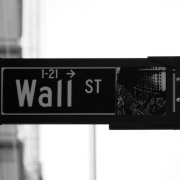The Echo Effect of the Bear Stearns Collapse: The Loss of Trust
 In the wake of the 10 year anniversary of the collapse of Bear Stearns, we’ve been considering the long-term impact of the financial crisis and its reverberations on Main Street today. For many, there’s been a seemingly permanent shift in how they view Wall Street, including its purpose and the people who have been charged with managing their hard earned money. While the economy may have recovered since the Great Recession, there are numerous former investors whose levels of trust in financial companies have not.
In the wake of the 10 year anniversary of the collapse of Bear Stearns, we’ve been considering the long-term impact of the financial crisis and its reverberations on Main Street today. For many, there’s been a seemingly permanent shift in how they view Wall Street, including its purpose and the people who have been charged with managing their hard earned money. While the economy may have recovered since the Great Recession, there are numerous former investors whose levels of trust in financial companies have not.
In a recent piece in The Wall Street Journal, writer Jason Zweig spotlights how the collapse of Bear Stearns wreaked havoc on the sense of fairness among everyday investors and “what psychologists call ‘belief in a just world,’ the notion that, on average, we get what we deserve.”
From the piece:
If you can’t believe honesty is rewarded and rule-breaking punished, how can you feel comfortable handing your money over to strangers? “People need to be able to trust something or someone,” says Luigi Zingales, a finance professor at the University of Chicago’s Booth School of Business. “The less you trust formal institutions and experts, the more you tend to trust your family and friends — or just anybody who sounds right.” Is it any surprise then that some individual investors have gotten wiped out playing wildly risky hunches on market volatility?
Zwieg points out that should there be some contrition from financial executives, it would mitigate the loss of confidence in their companies. Boards could also tie customer satisfaction to incentive payments for employees. However, this has yet to happen and probably won’t. As a result, there still exists a wide gap in the level of trustworthiness that investors feel towards these institutions.
In addition, quoting the article, “almost nobody thinks justice was served in the wake of the bailouts and failures of 2008 and 2009. …The latest round of the Financial Trust Index, a survey conducted by the Booth School and Northwestern University’s Kellogg School of Management, shows that 31% of investors remain angry or very angry about their economic situation.”
Trust can take decades to build and just a moment to shatter. Zwieg has crafted a piece that is important reading for both individuals looking to invest in large financial services companies and those that work there. For these organizations to thrive and regain long-term commitments, it will take a renewed focus on demonstrating to the public that they are looking towards the future with an eye on preserving good faith from customers today as well as tomorrow.
*Image courtesy of SQLeadership.com
Further Learning
- Learn more about Trust [Research Page]









